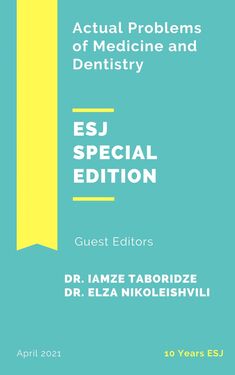Assessment of Complications of Inguinal Hernia Surgery
Abstract
Hernia repair is a frequent elective surgical operation. Unsatisfactory results in some cases have led to the persistence of a variety of different operative methods. Our study aimed to determine the frequency of postoperative complications with different surgery methods and evaluate the correlation of complications with patient characteristics and health. Materials and methods: We examined 403 patients with an inguinal hernia who underwent hernioplasty, including 98 by the method of Liechtenstein, 74 by the method of Gvenetadze, 231 by the laparoscopic method. Patients were aged 18-80 years with a mean age of 56.914.6 years. Statistical analysis was performed using SPSS 22. Results: The frequency of total perioperative complications of surgery was 52 (53.06 %), according to the method of Lichtenstein, 13 (17.57%) according to the method of Gvenetadze, and 23 (9.96 %) according to laparoscopic surgery. The following postoperative complications were observed: damage to the colon, bleeding from the lower epigastric vessels, urinary retention, neuralgia, hematomas, and delayed postoperative wound healing, higher in patients undergoing Lichtenstein surgery (p <0.05). The Liechtenstein method significantly increases the likelihood of complications; odds ratio OR=8.23 (95% CI: 4.87-13.94), with the Gvenetadze method, the relative chance decreases insignificantly OR=0.722 (95% CI: 0.30-1.39), with the laparoscopic method, the relative chance of complications are significantly reduced OR=0.20 (95% CI: 0.12- 0.34). Conclusions: The odds ratio of postoperative complications of hernioplasty increases with the Liechtenstein method and decreases with laparoscopy. A comparison of the open methods of hernioplasty shows an advantage of the Gvenetadze method over the Liechtenstein method.
Downloads
PlumX Statistics
Copyright (c) 2021 Gorgodze Teimuraz, Gvenetadze Tamaz, Sakvarelidze Ilona, Abaishvili Nino, Beriashvili Giorgi

This work is licensed under a Creative Commons Attribution-NonCommercial-NoDerivatives 4.0 International License.








